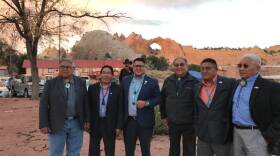As Thanksgiving approaches, commentator Scott Thybony remembers a summer spent with an Inuit family in the Canadian Arctic. The experience was one of different cultures coming together learning what they had in common, and as is often the case, food was a connective thread. Thybony has more in his latest Canyon Commentary.
One morning Bernie Sulurayok invited me on a caribou hunt and said he would bring lunch. The two of us pushed off in the freight canoe and motored along the edge of Hudson Bay to an isolated cove. Taking his rifle, he headed across the tundra and I followed. We covered ground for several hours, over rolling terrain and under a long stretch of pale sky. The mosquitoes were so thick, I inhaled them with each breath, so we kept to the ridges where an occasional breeze gave some relief. No sign of caribou turned up, not a single track.

We were both hungry by the time we returned to the boat. Sulurayok dug under a tarp and pulled out a haunch of raw caribou. He took a bite and sliced it off with an upward sweep of the knife. And then he handed it to me, the outsider. Having never eaten raw meat, I hesitated, but to understand another culture means participating in it. I took the leg and sunk my teeth into it. The first bite of caribou was warm in the stomach, and I handed the haunch back to Sulurayok. The two of us stood without talking in a tundra-floored world under the wide Arctic sky.
As we got to know each other, I talked with him about our different customs. He listened politely before saying, “There is no difference. You and me, no difference. All men are the same but seem different.” He placed his hand on his chest and then settled back to finish his beer.

A storm was approaching when Sulurayok asked me to help him check his fishing nets. He was afraid of losing his catch. We climbed into the freight canoe and entered the inlet, already choppy with a building wind. Several miles out Sulurayok ran a zigzag course trying to find his nets, but the seas were too broken. He shouted to me, saying it was too dangerous to return. So he changed course, hoping to reach a small island where his relatives had a fishing camp. The storm worsened as the wind raked spray across the gunnels. Despite the heaving seas, the Inuit handled the boat well and tucked into the lea of the island. It was about 10:00 in the evening and the long twilight still held.
Hearing the outboard motor, an old Inuit stepped out of a wall tent and greeted us with a smile. He invited us to take shelter inside, and as we drank tea Sulurayok related our adventures, laughing with the old man at our troubles. We were soon taken to a guest tent and told to rest. Next morning I helped our host haul a net to shore to gather his catch. The aroma of cooking fish filled the tent as I munched a handful of Oreo cookies and ate some canned bacon. By tradition, guests were served the best food in the house, while the family had to settled for the standard fare of fresh Arctic char.
The last time I saw Sulurayok was to say goodbye. But since the Inuit have no word for goodbye, I described the journey I’d be taking back home. He followed me to a point, and then I lost him. The distances were too vast, the land passed over too hard to imagine. He was quiet for a while before saying, “Many thinks between here and there.” And then he laughed. I returned to the American Southwest, back to landscapes as expansive as the northern tundra.








